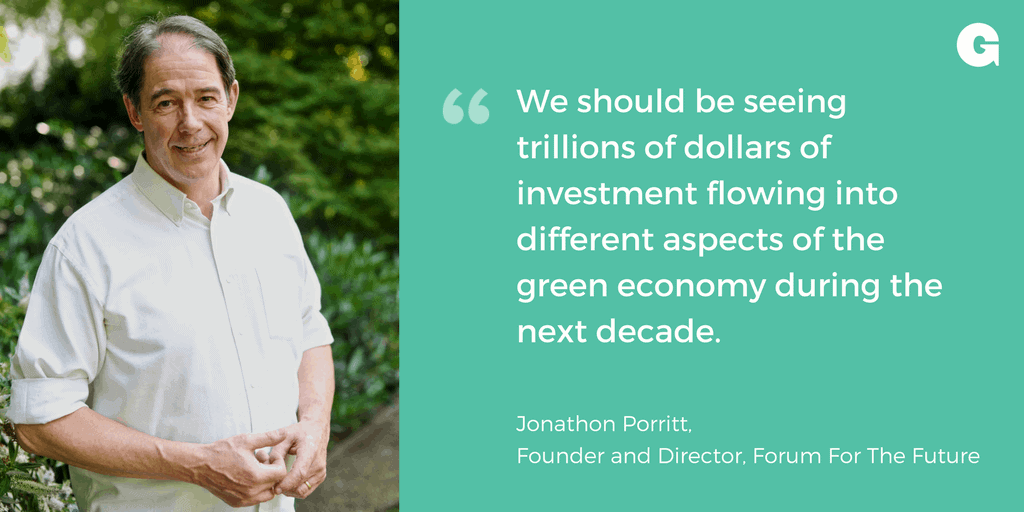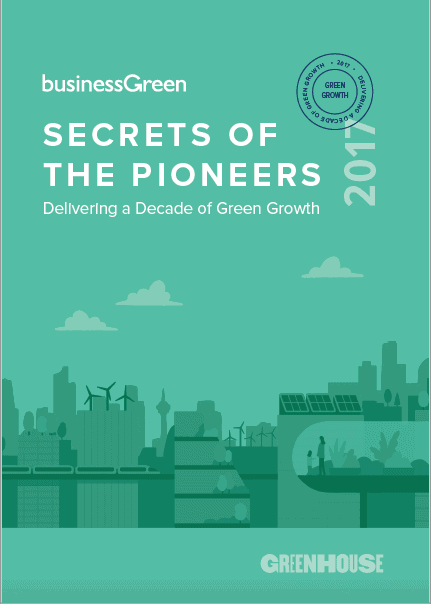Secrets of the Pioneers: Jonathon Porritt

We talk to Sir Jonathon Porritt, founder and director of sustainability non-profit Forum for the Future. The interview is part of a series for a report, Secrets of Pioneers, Delivering a Decade of Green Growth, which will be launched at the Business Green Leaders Summit on 9th November 2017.
Porritt helped set up the Forum in 1996 and has since seen it expand beyond the UK with offices in the US, India, and Singapore.
A leading environmentalist and writer of numerous books on sustainability issues, Porritt worked as director of Friends of the Earth from 1984 1991. He was later appointed by the Blair government to chair the Sustainable Development Commission for two terms between 2000 and 2009.
Sir Jonathon Porritt also became chancellor of Keele University in 2012 and remains an active political campaigner for the Green Party and a number of other causes.
Where were you in 2007?
I was chairman of the Sustainable Development Commission at the same time as Forum for the Future was expanding internationally. The Forum had been going for seven years, and we had just got into this incredibly rich period of engagement with the Labour government doing this real joined-up, delivery-based approach to sustainable development across central government departments and local government. It was amazing. And I look at the government scene now and I think ‘oh my God, that was a high point’.
What did business sustainability look like 10 years’ ago?
Good. It was good. There were a few companies doing big-picture, joined-up sustainable development, although it is also timely to remember how fragile, unfought, and naive some of it was – a lot of it was quite disconnected.
So I think one of the best things over the last 10 years is the degree to which business has upped its game. It has become much more integrated in its thinking, more sophisticated, better able to bring about real change on the ground and through supply chain management, relationships with business partners and consumers and so on. So 10 years’ ago it wasn’t bad, but it looks quite primitive in comparison to where we are now.
We have to think much more broadly about the systems in which those companies operate and how they can combine forces with other players to effect change at a systemic level.
What has been the biggest barrier for companies improving their sustainability credentials?
There is a real barrier here. It is clear companies have to be able to demonstrate the ‘business case’ because if they can’t do that, it is quite hard to actually justify to shareholders this is something that is absolutely in their interests.
Many companies have never really got their heads around it and that’s proving now to be quite problematic, because the basic ground rules of our capitalist economy have really changed.
The pursuit of economic growth indefinitely into the future on our finite planet is the closest thing we have to modern, species-wide insanity. You don’t really hear anybody articulate that in modern politics. You do hear more of it – tempered and a little bit nuanced, obviously – in capital markets and amongst some of the savvier investment houses with people thinking about stranded assets and returns over time. But there’s no mainstream challenge to that central premise for what progress for humankind looks like.

What’s the most important thing you’ve learned in the past 10 years?
For us in the Forum there has been a really big set of lessons that we’ve had to internalise in the last four or five years. The first is that business is a hugely important and significant player in changing the circumstances out there and in improving the current state of play. You wouldn’t have said that 10 years’ ago, but now you can say that emphatically, and they are right there as a major agent of change in their own right.
Also, when I think of the role of business in climate issues, particularly at the time of the Paris summit and the agreement around the SDGs business was very active in its advocacy work. They were a major influence, succeeding in bringing politicians with them.
What do you see as the biggest sustainability challenges for the next decade?
One of the biggest problems we’ve got at the moment is the debate about climate change has focused almost exclusively on energy, transport, materials, infrastructure – the man made, physical world that we depend on to create wealth. The land-based aspects of climate are much less understood and developed.
What do you think the green economy will look like in 10 years’ time?
It is changing so fast. 10 years ago there were lots of outright cynics saying the green economy was just window dressing and not even worth talking about as a sector in the way we categorise economic activities – it was just a bit of rhetoric for politicians to play around with.
10 years on those cynics have completely disappeared, just by virtue of the scale of market activity under different headings in the green economy. And if you project those growth curves forward, the green economy won’t work as a concept in 10 years’ time because it will be too bloody big. So I’m hugely hopeful about that, and what makes me particularly hopeful is that will get investors to re-calibrate their future value in earnings over time in terms of their own portfolios, and that means we should be seeing trillions of dollars of investment flowing into different aspects of the green economy during the next decade. It has to, as we know it’s not moving fast enough right now.

This is the second in a series of interviews produced by Greenhouse PR and BusinessGreen, featuring more than 20 leaders of the green economy, from the worlds of science, politics, academia and business. These pioneers reflect on the lessons they have learnt over the last decade, and their predictions on the future of the next decade of green growth.
The full set of interviews makes up a report, Secrets of the Pioneers: Delivering a Decade of Green Growth, to be published on 9th November, coinciding with the BusinessGreen Leaders’ Summit.
We will be previewing several interviews on the Greenhouse PR blog this week. These include Christiana Figueres, former executive secretary of the United Nations Convention on Climate Change (UNFCCC) on Monday, Dr Emily Shuckburgh from British Antarctic Survey on Wednesday, Mike Barry from Marks & Spencer on Thursday and Sir Ian Cheshire, chair of Debenhams and Barclays UK, on Friday.
This year marks the 10th anniversary of both BusinessGreen and Greenhouse PR, the specialist communications agency which supports businesses, entrepreneurs and campaigners working to create a green economy.
At Greenhouse, we support a wide variety of organisations pioneering new standards of sustainability across multiple sectors. Whether it’s fashion, finance or farming, we’re always on the look-out for new opportunities to reach our clients’ target audiences. If you’ve got a great story and need our help to tell it, we’d love to hear from you.


